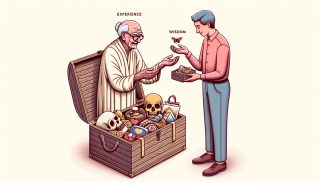Wisdom
Living vs. Learning: The Wisdom Within
Recall and reflect: How experience and wisdom differ.
Posted October 16, 2023 Reviewed by Devon Frye
Key points
- Studies show depth of reflection, not experience, cultivates wisdom.
- Recruiters should value reflective insights over mere experience.
- Mentorship emphasizes deep reflection for growth.
- Introspection on life events boosts personal and professional growth.
When one thinks of wisdom, it's often associated with age or a wealth of experiences. However, the distinction between experience and wisdom is crucial.
Experience encapsulates the myriad events, challenges, and situations encountered throughout life. Yet it's a misconception to believe that merely accumulating these experiences guarantees wisdom. True wisdom, as researchers and thinkers have posited, emerges from the ability to reflect deeply on these experiences, extracting lessons and insights that guide future actions and thoughts.

Insights from Research
A previous study clearly indicated that having a vast reservoir of experiences doesn't automatically translate to possessing wisdom. The defining feature in the journey from mere experience to wisdom was notably the quality and depth with which individuals reflected on their past events.
In other words, it wasn’t just the sheer number of times someone looked back on their memories that mattered; it was the intensity, sincerity, and purpose behind such retrospections. Those individuals who genuinely endeavored to unravel their experiences, seeking to pull apart the threads of their memories to discern valuable lessons and avenues for personal evolution, undeniably showcased attributes commonly associated with wisdom.
Their approach was introspective, rooted in a desire for self-improvement and a deeper understanding of life's intricacies. On the other end of the spectrum were those who only skimmed the surface of their memories, choosing to view them in a generalized, often rosy light. While such an approach might demonstrate an ability to move forward and adapt, it doesn't necessarily lead to the profound insights and understanding that characterize true wisdom.
Implications in Recruitment and Mentorship
In the modern professional landscape, the differentiation between experience and wisdom is increasingly relevant. During recruitment, a candidate's resume often serves as a testament to their experiences.
However, forward-thinking recruiters and organizations are increasingly recognizing that the true value lies in understanding a candidate's reflections on those experiences. It's in these reflections that the depth of a candidate's problem-solving abilities, adaptability, and emotional intelligence becomes evident.
Similarly, in the realm of mentorship, there's a shift from the traditional paradigm of merely sharing experiences; instead, modern mentorship practices emphasize guiding mentees in introspective practices. It's about helping them navigate their experiences, encouraging deep reflection, and fostering an environment where they can derive profound insights and lessons, setting the foundation for genuine growth.
Conclusion
Life presents us with an endless tapestry of experiences, some joyful and others challenging. However, as research and observations indicate, it's not merely the events of our lives that shape our wisdom but how we choose to reflect upon them. Embracing introspection and deep reflection can lead to not only personal enlightenment but also professional growth, emphasizing the importance of understanding the true essence of wisdom.
LinkedIn image: miya227/Shutterstock
References
Weststrate, N. M., & Glück, J. (2017). Hard-earned wisdom: Exploratory processing of difficult life experience is positively associated with wisdom. Developmental psychology, 53(4), 800.


